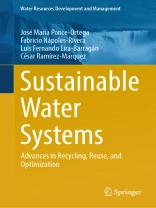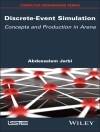This book explores advanced recycling and optimization techniques, offering a blend of practical case studies and theoretical models that push the boundaries of traditional water management practices. Each chapter covers various aspects of sustainable water management, from the reuse of wastewater in residential complexes to the design of eco-industrial parks. By integrating environmental engineering, economics, and urban planning, the book addresses the pressing need for sustainable water solutions, presenting cutting-edge optimization models and economic analyses crucial for professionals and decision-makers. The incorporation of dynamic and strategic planning in the context of environmental constraints and uncertainties makes it an essential resource for navigating the complexities of modern water systems. Providing innovative strategies for a sustainable future, this book stands as a pivotal work in the field of water resource management.
विषयसूची
Introduction.- Recycle and Reuse Water Network.- Comprehensive Optimization for Multi Contaminant Wastewater Process Integration Networks.- Sustainable Management of Water in Macroscopic Systems.- Sustainable Urban Water Systems Design Incorporating Future Projections for Optimal Configuration.- Rainwater Collecting Systems for a Residential Development.- Mixed Integer Nonlinear Programming (MINLP) Model for Determining the Optimal Site for a New Industrial Facility with Integrated Economic and Environmental Criteria.- Designing Water Networks with a Focus on the Sustainability of the Adjacent Watersheds.- Integrating Water Networks Characteristics and Watershed Sustainability into Industrial Facility Site Selection.- Development of Eco Industrial Parks in Interaction with Adjacent Watershed.- Selecting Optimal Site for Biorefineries A Focus on Environmental Sustainability Integration.- Optimizing the Placement of New Industrial Facilities Dynamically with Watershed Sustainability Considerations.- Optimizing the Recycling of Flowback Water in Hydraulic Fracturing with Consideration of Seasonal and Environmental Limitations.- Strategic Water Management for Shale Gas Production under Uncertainty.-Comprehensive Planning for Optimal Management of Different Types of Shale Gas Wastewater.-Optimizing the Water Energy Relationship in Hydraulic Fracturing by Utilizing CO2 and Water as Fracturing Agents.- Optimal Configuration of Water Networks in Shale Gas Hydraulic Fracturing Involving Economic and Environmental Considerations.
लेखक के बारे में
José María Ponce-Ortega is a Professor in the Chemical Engineering Department at Universidad Michoacana de San Nicolás de Hidalgo, Mexico. His research interests include the optimization of chemical processes, sustainable design, energy, mass, water, and property integration, and supply chain optimization.
Fabricio Nápoles-Rivera is a Professor in the Chemical Engineering Department at Universidad Michoacana de San Nicolás de Hidalgo, where he also serves as the Head of the Department. His research interests focus on various aspects of chemical engineering.
Luis Fernando Lira-Barragán is a Professor in the Chemical Engineering Department at Universidad Michoacana de San Nicolás de Hidalgo, Mexico. His research interests include mass integration, shale gas production, simulation of watersheds, energy integration, synthesis of heat exchanger networks (HEN), and waste heat recovery.
César Ramírez-Márquez is a Postdoctoral Fellow in the Chemical Engineering Department at Universidad Michoacana de San Nicolás de Hidalgo, Mexico. His research interests are centered on the production of materials for the solar energy industry and base chemicals in the chemical industry.












